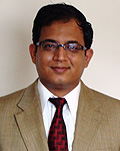Experiments and Models Regarding Strain Dependent Thermal Conductivity and Strength at the Nanoscale and Microscale
Category
Published on
Abstract
Bio
 Dr. Tomar received his PhD from the Georgia Institute of Technology-Atlanta, USA in December, 2005. Dr. Tomar has made 70 technical presentations, edited/contributed to 3 books and journal special issues, written 1 book, 45 peer-reviewed international journal publications, 14 proceeding articles, 1 research patent, 2 invention disclosures, and given numerous invited talks at universities as well as international conferences. He serves on editorial board of three international journals focusing on nanotechnology, has served as a peer reviewer for more than 25 international journal publications as well as organized/co-organized five national and international symposia for societies such as the American Society of Mechanical Engineers (ASME), the Materials Research Society (MRS), and the minerals, metals, and materials society (TMS).
Dr. Tomar received his PhD from the Georgia Institute of Technology-Atlanta, USA in December, 2005. Dr. Tomar has made 70 technical presentations, edited/contributed to 3 books and journal special issues, written 1 book, 45 peer-reviewed international journal publications, 14 proceeding articles, 1 research patent, 2 invention disclosures, and given numerous invited talks at universities as well as international conferences. He serves on editorial board of three international journals focusing on nanotechnology, has served as a peer reviewer for more than 25 international journal publications as well as organized/co-organized five national and international symposia for societies such as the American Society of Mechanical Engineers (ASME), the Materials Research Society (MRS), and the minerals, metals, and materials society (TMS).
He has been awarded the Air Force Office of Scientific Research (AFoSR)-Young Investigator Award (2009- 1012), ASME Materials Division “Orr” Family award for excellence in failure of materials research (2010), Elsevier-Materials Science and Engineering-C Young Researcher Award for excellence in research at the interface of biology and materials engineering by a researcher under age 35, and TMS Early Career Faculty Fellow Award-Honorable Mention (2010). Funding for his work has come from the National Science Foundation (NSF), the Department of Energy (DoE), ARMY, office of naval research (ONR), and AFoSR. Dr. Tomar is a member of the American Institute of Aeronautics and Astronautics (AIAA), ASME, Society of Engineering Science, and TMS.
Besides research Dr. Tomar has been a funding reviewer for two panels at NSF, two panels at DoE, one panel at Swiss National Science Foundation, and one panel at Hong-Kong University of Science and Technology. Dr. Tomar also has been involved in education and its integration with research activities at both grass-root and advanced levels. Dr. Tomar has been an active advocate and participant in establishing a pre-engineering program at West Side High School Gary-IN. He has also been active in integrating diverse groups in technical education both at undergraduate and graduate levels.
Sponsored by
Cite this work
Researchers should cite this work as follows:
Time
Location
Birck Nanotechnology Building, Room 1001, Purdue University, West Lafayette, IN